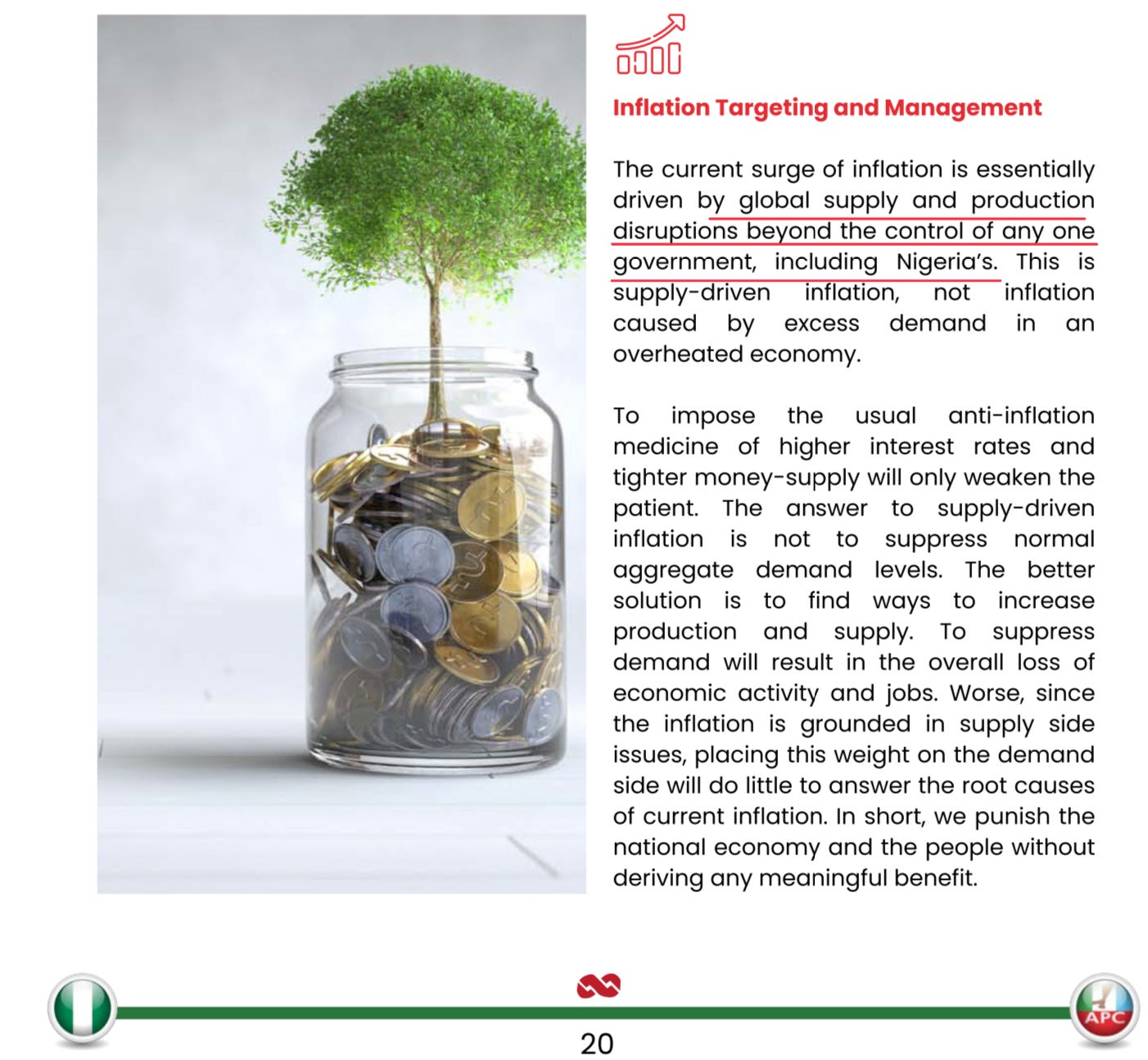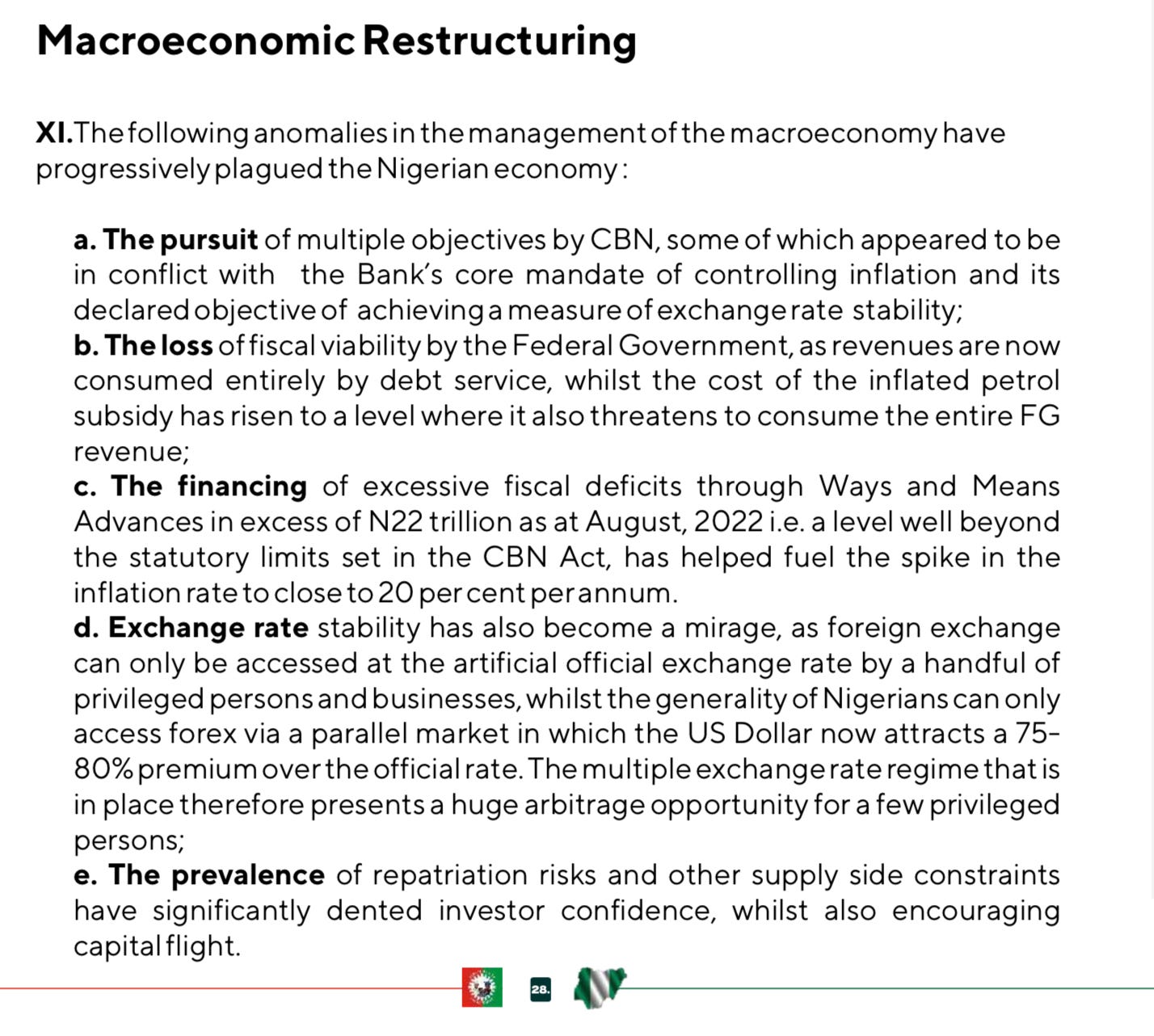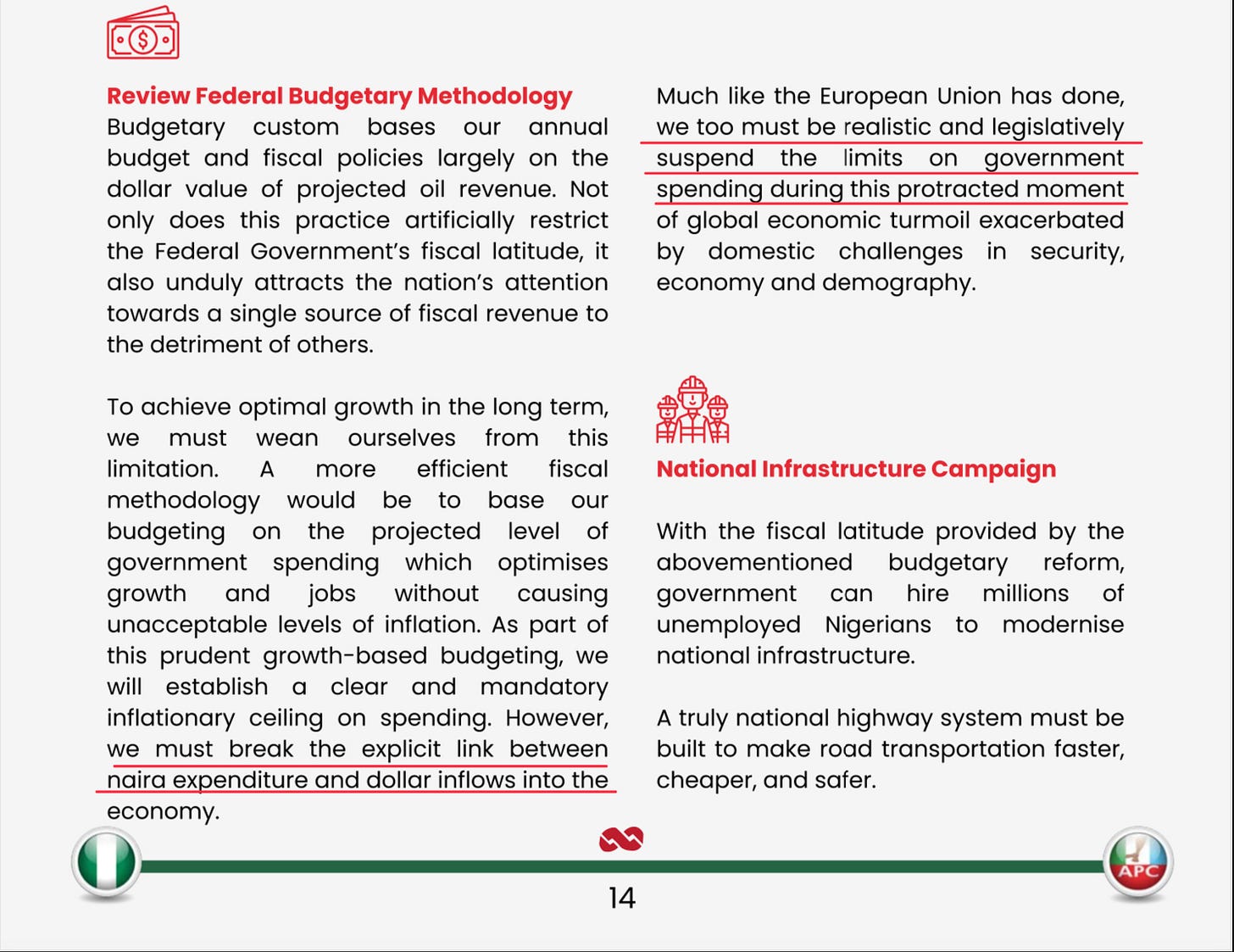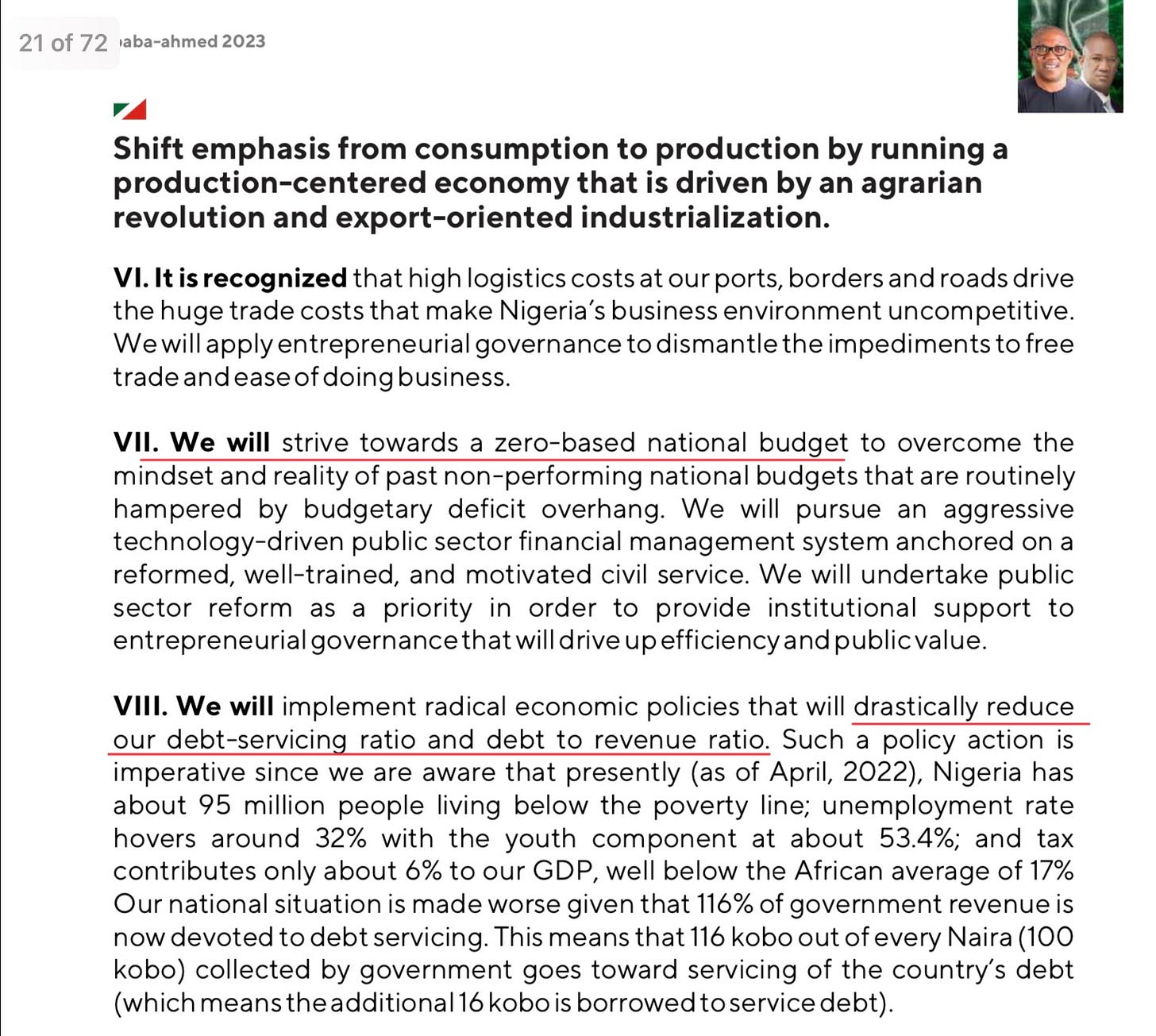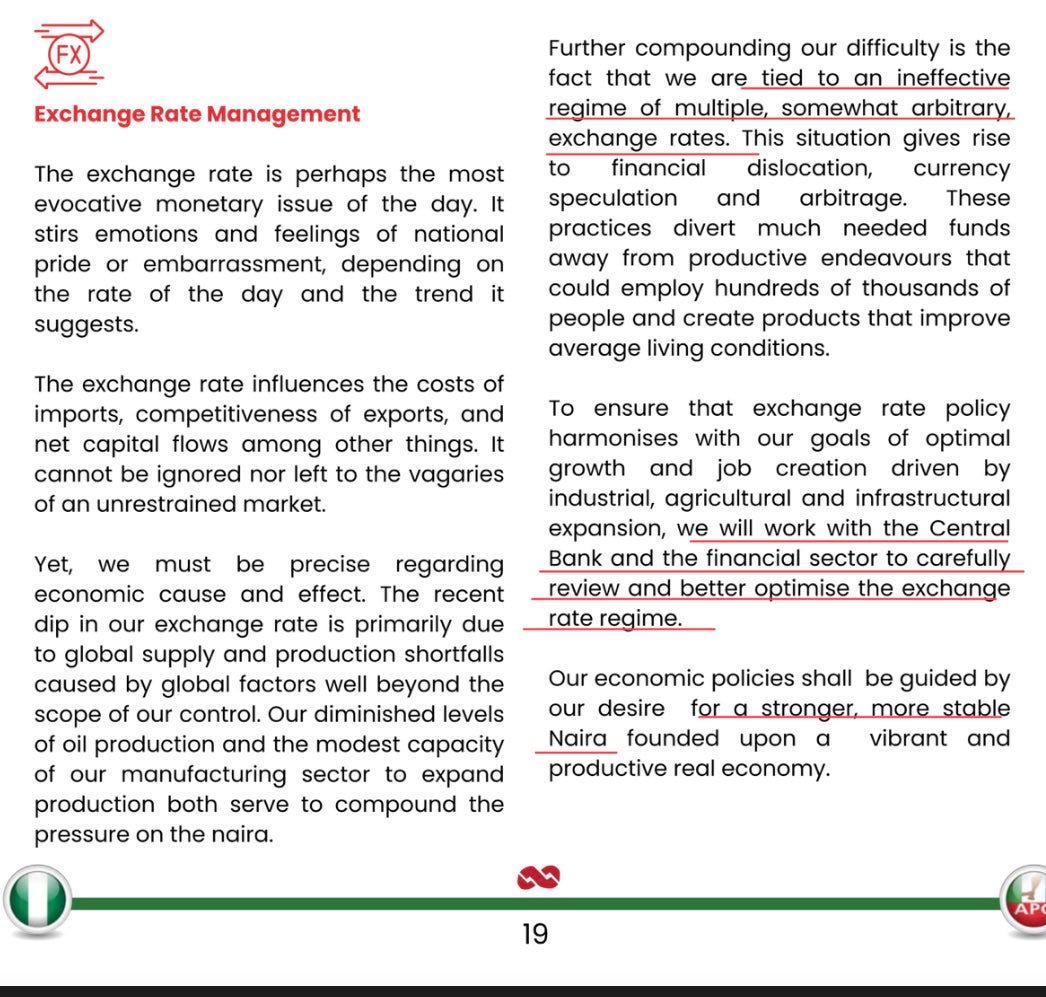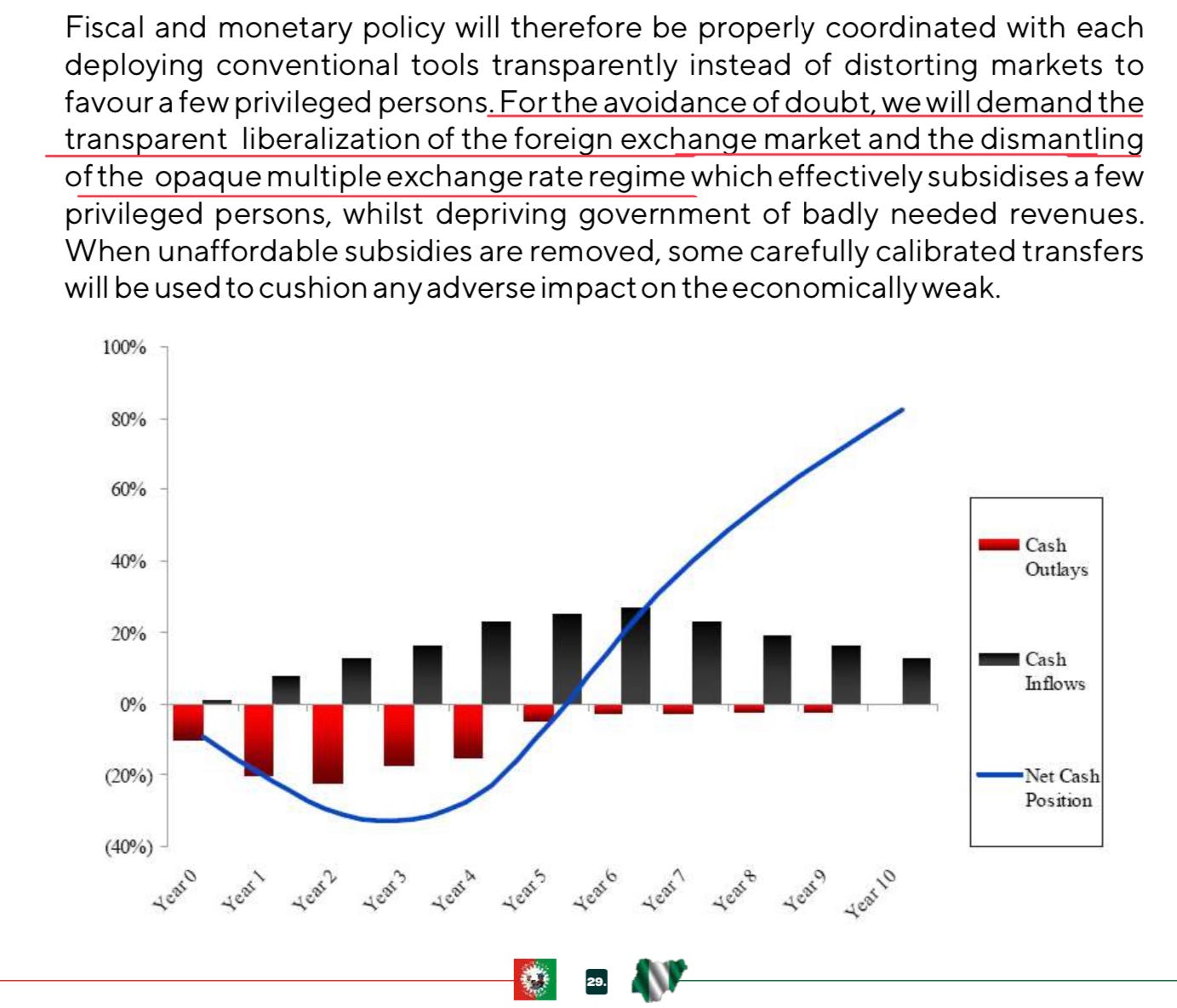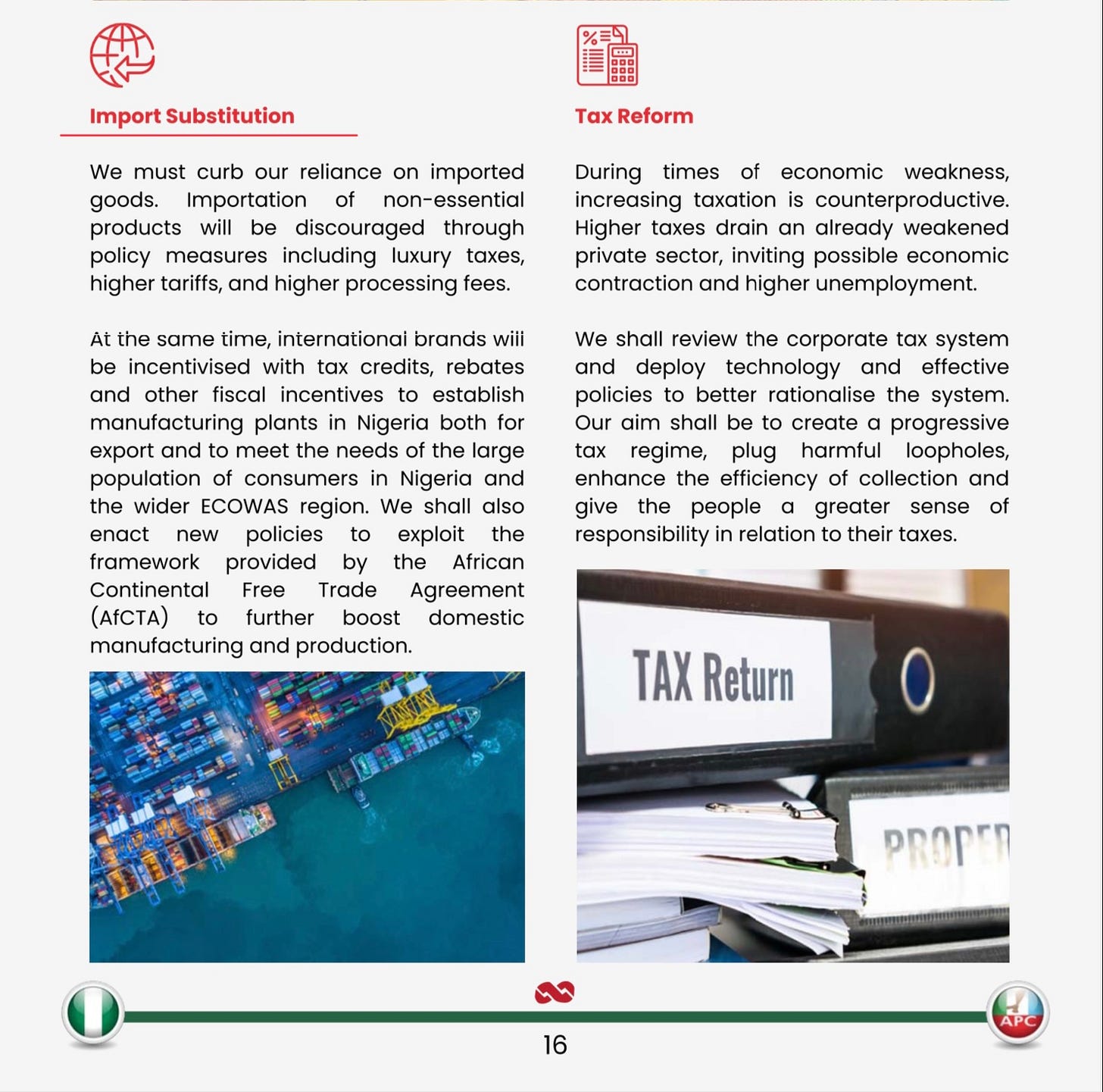Macroeconomics of the Manifestos
The policy differences between Nigeria's presidential frontrunners
While many citizens don’t care about manifestos having been traumatized by false promises, these documents can actually give useful insight into the general ideological leanings of the parties. Although politics in Nigeria generally lacks ideology, there are stark differences in the positions of the manifestos on Inflation management, government spending & debt, exchange rate policy and international trade. It is no secret that Nigeria is at an important economic crossroads, so understanding these policy differences is paramount for investors, businesspeople and responsible citizens.
Let me preface by saying that there is nothing any of the three frontrunners can do to avoid economic pain in the short term - the country’s fate has already been sealed in that regard. These documents can only hope to outline the necessary adjustments to change the direction of our economy in the medium to long term. Below is a summary of each candidates policy stances:
Inflation Management
Inflation in Nigeria is at the highest level in two decades and the Naira has lost over 90% of its value since the present administration took office. The source of these economic issues is the first point of disagreement between the two manifestos, and it sets the tone for the policies they each go on to propose.
The APC manifesto claims that our inflation problems stem from global supply and production constraints outside the control of the government their party currently controls. The problem is that these so-called global constraints stem from this year’s war in Ukraine and lingering lockdowns in China. Yet, Nigeria has been in economic turmoil for six years, long before either situation materialized.
In contrast to APC, the Labour Party manifesto suggests that our inflation and the resulting problems are because of anomalies caused by government actions. The manifesto takes the time to outline the cause of every macroeconomic problem we face, generally echoing the consensus of economic experts both at home and abroad.
Government Spending & Debt
The news coming out of Accra this week is a perfect example of the dangers of reckless government spending and should serve as a cautionary tale for Nigerians. In case you missed it, Ghana has announced that it will default on its debt; effectively wiping out a large percentage of bank assets in the country and triggering one of the largest wealth destruction events in the history of the region. Events like these are generally spaced out because when times are good, you can keep borrowing more to service debts without having to reduce spending.
What has happened to Ghana, and is happening to Nigeria, is that the avenues for borrowing to pay back old borrowings have become too expensive and effectively closed. When this happens, governments can either reduce spending and pay back in hard money, which is economically painful because one man’s spending is another man’s income, or they can print money to keep spending and inflate away the debt; at the cost of high inflation and destruction of the currency. Today, Nigeria spends 116 Kobo servicing debt out of every 100 Kobo it earns, and the central bank has printed over 20 trillion Naira out of thin air, indicating that we are already headed in Ghana’s direction at best and Venezuela’s direction at worst.
As evidenced by the Buhari administration’s consistent fiscal deficits and further buttressed by the Tinubu manifesto: APC believes that you can spend your way to prosperity. Not only does the Tinubu manifesto propose even more spending, but it also explicitly states a desire to suspend the limits on government spending and money printing. This is shocking and, quite frankly, terrifying. These limits, codified in the CBN Act (and repeatedly broken by Buhari and Emefiele), exist for very good reasons. If the government does not reign in its spending; inflation will accelerate, the Naira will continue falling, and the country will be at an intolerably high risk of hyperinflation. This is a categorical fact.
Perhaps even more shocking and terrifying is that the APC is aware of these effects but believes that they have the knowledge to determine the level of spending that won’t make inflation too high. Do you trust any government, let alone APC, to be able to make that calculation accurately? Even with an unlimited budget financed by money printing, their bright idea is to hire millions more Nigerians to work for the government, thereby enlarging the state and incurring recurrent liabilities. Nigerians need less government, not more and both the Labour Party and PDP agree.
On the opposite end of the spectrum, the Labor party has proposed a zero-based national budget and outlined exactly where they will make the budget cuts. While the proposed changes may not successfully balance our budget, it is precisely the direction the government must head to if it is to have a chance of avoiding outright collapse. One potential source of savings would be derived from implementing the Oronsaye report, which could see over 100 government parastatals abolished or merged.
The bulk of the proposed savings, of course, will come from removal of the notorious fuel subsidy which would cost the government N6 trillion if it ran for the whole year. The APC manifesto also suggests a phased removal of the subsidy, but why would that be a priority for a government without spending limits?
Exchange Rate Management
Despite describing the exchange rate as ‘the most evocative monetary issue of the day’ and accurately describing the problem with our multiple exchange rate system, the APC manifesto has nothing more to say about it other than “we will work with the CBN and financial sector to review and optimize it”. The stated goal of a stronger naira is not only unrealistic but also terrible for domestic conditions. When this goal is considered in the context of their proposed government spending, it becomes a cheap lie.
Labour Party explicitly states that they will abolish the multiple exchange rate regime. While the manifesto avoids the dirty ‘devalue’ word, that will certainly be the result of abolishing the system. Such a devaluation will surely be painful, but the benefits far outweigh the costs as dollars will become available for all Nigerians at the true market price. For the broader economy, a sharply depreciated naira will make it possible to offer a positive total return on the currency at a lower interest rate while also benefiting our trade balance.
Foreign Trade & Import Substitution Vs. Export Orientation
Unsurprisingly, the differences in ideology also extend to the respective trade policy. Tinubu favours a policy of import substitution, which we currently practice, while Obi seeks a change to an export-oriented policy which is more in line with free trade. While the APC plans to ‘exploit the AfCTA’, their proposals of higher tarriffs and fees are at odds with such plans. APC’s aim with these policies is to import less and export more, which is not a bad goal in and of itself. The issue is that the market distortions created by these policies ultimately end up increasing import dependence, among other intolerable economic costs.
Make no mistake; these distortions are features of this ideology, not bugs. Import substitution has been tried, tested, and failed globally - from the Middle East and North Africa to Latin America. Now it is failing Nigeria again. Venezuela pursued similar import substitution policies with famously horrendous economic results. We have followed the same policies under the current administration and achieved nearly identical results. After seeing the end of the Venezuela movie, should we choose to continue copying their script?
Despite having the largest oil reserves in the world, even bigger than Saudi Arabia, Venezuelan citizens still queue for hours to get petrol. The distortions created by subsidies and price controls made it spectacularly profitable to smuggle petrol over the border to Colombia. Like us, they also overvalued their currency via a dual exchange rate system which increased corruption and arbitrage and led their debts to foreign airlines to grow to the point that the airlines left the country, leaving most citizens stranded to endure the hyperinflationary collapse. Nigeria is really not unique.




